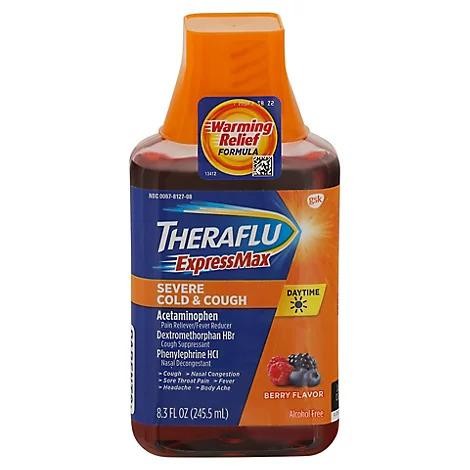
Contents
dextromethorphan
Brand Names: Balminil DM, Benyln DM, Bronchophan, Buckleys DM, Calmylin #1, Delsym, Koffex DM, Novahistex DM, Robitussin Lingering Cold Long-Acting Cough, Robitussin Lingering Cold Long-Acting CoughGels, Children’s Robitussin Cough Long-Acting, Sucrets 8 Hour Cough Relief DM Cough Formula
Drug Class: Antitussives
What is dextromethorphan and what is it used for?
Dextromethorphan is used to control coughs caused by the common cold, flu, or other conditions. It can temporarily relieve cough, but does not treat the underlying cause or aid in recovery.
Dextromethorphan is available over-the-counter under multiple brand names. It is also often combined with other medications such as antihistamines and painkillers.
Dextromethorphan suppresses cough by reducing the sensitivity of cough receptors in the brain, preventing the transmission of cough impulses. It is a non-opioid drug derived from levorphanol and structurally similar to opioid drugs like codeine.
Dextromethorphan does not interact with opioid receptors, so it does not have analgesic or addictive properties. However, it can increase the levels of chemical messengers like serotonin and has the potential for abuse.
Warnings
- Do not take dextromethorphan if you are allergic to it or any of its components.
- Avoid taking dextromethorphan with monoamine oxidase inhibitors (MAOIs) as it can lead to serotonin syndrome.
- Do not give dextromethorphan to children under 4 years old without a prescription. Use caution in children aged 4-11.
- Dextromethorphan may cause hallucinations, confusion, agitation, overactive reflexes, shivering, muscle twitching, and rapid heart rate.
- Do not use for persistent or chronic cough associated with smoking, asthma, or emphysema, or if you have excessive phlegm, unless prescribed by your doctor as it may slow respiration rate.
- Some brands of dextromethorphan may contain aspartame, which is a source of the amino acid phenylalanine. Use with caution in patients with phenylketonuria.
- Use with caution in sedated, debilitated, or supine patients.
Side Effects
Common side effects of dextromethorphan include dizziness, lightheadedness, drowsiness, sedation, nervousness, restlessness, confusion, nausea, vomiting, stomach pain, and constipation.
This is not a complete list of side effects. Contact your doctor for medical advice regarding serious side effects or adverse reactions. Report side effects or health problems to the FDA at 1-800-FDA-1088.
Dosages
Tablet
Capsule
Gel, oral
Liquid, oral
- 7.5 mg/5 ml
- 10 mg/5 ml
- 15 mg/5 ml
Syrup, oral
- 5 mg/5 ml
- 7.5 mg/5 ml
- 10 mg/5 ml
- 15 mg/5 ml
- 20 mg/15 ml
Liquid, extended-release
Lozenge
Strip, oral
Adult
Cough
- Liquid and syrup: 10-20 mg orally every 4 hours or 30 mg every 6-8 hours
- Gel: 30 mg orally every 6-8 hours, not to exceed 120 mg per day
- Extended-release: 60 mg orally every 12 hours, not to exceed 120 mg per day
- Lozenges: 5-15 mg orally every 1-4 hours, not to exceed 120 mg per day
- Strips: 30 mg orally every 6-8 hours, not to exceed 120 mg per day
Dosing considerations
- Abuse potential is much lower than codeine.
- About 15-30 mg dextromethorphan is equal to 8-15 mg codeine as an antitussive.
Pediatric
Cough
- Children under 4 years: prescription only
Extended-release:
- Children 4-6 years old: 15 mg orally twice daily, not to exceed 30 mg per day
- Children 6-12 years: 30 mg orally twice daily, not to exceed 60 mg per day
- Children over 12 years: 60 mg orally twice daily, not to exceed 120 mg per day
Liquid/Syrup
- Children 4-6 years old: 7.5 mg every 6-8 hours, not to exceed 30 mg per day
- Children 6-12 years old: 15 mg orally every 6-8 hours, not to exceed 60 mg per day
- Children over 12 years: 10-20 mg orally every 4 hours or 30 mg every 6-8 hours, not to exceed 120 mg per day
Gel
- Children over 12 years: 30 mg every 6-8 hours, not to exceed 120 mg per day
Lozenges
- Children 6-12 years: 5-10 mg every 1-4 hours, not to exceed 60 mg per day
- Children over 12 years: 5-15 mg orally every 1-4 hours, not to exceed 120 mg per day
Strips
- Children 6-12 years: 15 mg orally every 6-8 hours, not to exceed 60 mg per day
- Children over 12 years: 30 mg orally every 6-8 hours, not to exceed 120 mg per day
Dosing Considerations
- Potential toxic doses for children under 6 years: 10 mg/kg
- About 15-30 mg dextromethorphan is equal to 8-15 mg codeine as an antitussive
Addiction/Overdose
- Dextromethorphan is not addictive like opioid medications but has the potential for abuse. Reports of abuse, especially among teenagers, have been documented.
- Overdose can cause severe side effects, particularly in children. Seek immediate medical help or contact the Poison Control Center in case of overdose.
Drug Interactions
Inform your doctor of all medications you are currently taking, as they can advise you on possible drug interactions. Do not start, stop, or change the dosage of any medication without your doctor’s recommendation.
- Severe Interactions: isocarboxazid, phenelzine, procarbazine, rasagiline, safinamide, selegiline, tranylcypromine
The above list of drug interactions is not exhaustive. For more information, use the RxList Drug Interaction Checker. Always inform your doctor, pharmacist, or healthcare provider of all prescription and over-the-counter medications you use, including the dosage for each. Keep a list of this information for reference. Consult your doctor or healthcare provider if you have any questions about the medication.
Pregnancy and Breastfeeding
- Insufficient information is available on the use of dextromethorphan during pregnancy and breastfeeding.
- Consult your doctor before taking dextromethorphan if you are pregnant, planning to become pregnant, or breastfeeding.
Other Considerations
- Follow package instructions exactly when taking OTC drugs. Do not exceed the recommended dose.
- Store dextromethorphan out of reach of children and dispose of unused medication properly.
- Contact your doctor if your cough does not improve within 7 days, returns after going away, or is accompanied by other symptoms like fever, rash, or headache.
Summary
Dextromethorphan is an OTC cough suppressant used to relieve coughing caused by the common cold, flu, or other illnesses. Common side effects include dizziness, lightheadedness, drowsiness, sedation, nervousness, restlessness, confusion, nausea, vomiting, stomach pain, and constipation. Dextromethorphan is not addictive but has the potential for abuse. Consult your doctor before taking dextromethorphan if you are pregnant or breastfeeding.


